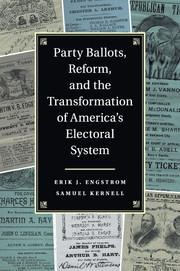Description
Party Ballots, Reform, and the Transformation of America's Electoral System
Authors: Engstrom Erik J., Kernell Samuel
This book demonstrates that nineteenth-century electoral politics were the product of institutions that prescribed how votes were cast and were converted into political offices.
Language: English
Subject for Party Ballots, Reform, and the Transformation of...:
Approximative price 31.58 €
In Print (Delivery period: 14 days).
Add to cart
Party Ballots, Reform, and the Transformation of America's Electoral System
Publication date: 09-2016
Support: Print on demand
Publication date: 09-2016
Support: Print on demand
Approximative price 92.80 €
In Print (Delivery period: 14 days).
Add to cart
Party Ballots, Reform, and the Transformation of America's Electoral System
Publication date: 10-2014
Support: Print on demand
Publication date: 10-2014
Support: Print on demand
Description
/li>Contents
/li>Biography
/li>
This book explores the fascinating and puzzling world of nineteenth- and early twentieth-century American elections. It examines the strategic behavior of nineteenth-century party politicians and shows how their search for electoral victory led them to invent a number of remarkable campaign practices. Why were parties dedicated to massive voter mobilization? Why did presidential nominees wage front-porch campaigns? Why did officeholders across the country tie their electoral fortunes to the popularity of presidential candidates at the top of the ticket? Erik J. Engstrom and Samuel Kernell demonstrate that the defining features of nineteenth-century electoral politics were the product of institutions in the states that prescribed how votes were cast and how those votes were converted into political offices. Relying on a century's worth of original data, this book uncovers the forces propelling the nineteenth-century electoral system, its transformation at the end of the nineteenth century, and the implications of that transformation for modern American politics.
1. An era in need of explanation; 2. The puzzle of responsive elections; 3. National forces in presidential elections; 4. House of Representatives elections; 5. Senate indirect and direct elections; 6. State legislative elections; 7. Gubernatorial elections; 8. Dismantling the party-ticket system; Appendix: states as bundles of electoral laws, 1840–1940.
Erik J. Engstrom is a professor of political science at the University of California, Davis. He previously taught at the University of North Carolina, Chapel Hill. He received his PhD from the University of California, San Diego, in 2003. Engstrom is the author of Partisan Gerrymandering and the Construction of American Democracy. His research articles have appeared in numerous journals, including the American Political Science Review and the American Journal of Political Science.
Samuel Kernell is a distinguished professor of political science at the University of California, San Diego. He has also taught at the University of Mississippi and the University of Minnesota and has served as a Senior Fellow at the Brookings Institution. Kernell received his PhD from the University of California, Berkeley. He has written numerous articles and books, including Strategy and Choice in Congressional Elections, 2nd edition (1983, with Gary C. Jacobson), James Madison: The Theory and Practice of Republican Governance (2005), Going Public: New Strategies of Presidential Leadership, 4th edition (2006), and The Logic of American Politics, 6th edition (2014, with Gary C. Jacobson, Thad Kousser, and Lynn Vavreck).
Samuel Kernell is a distinguished professor of political science at the University of California, San Diego. He has also taught at the University of Mississippi and the University of Minnesota and has served as a Senior Fellow at the Brookings Institution. Kernell received his PhD from the University of California, Berkeley. He has written numerous articles and books, including Strategy and Choice in Congressional Elections, 2nd edition (1983, with Gary C. Jacobson), James Madison: The Theory and Practice of Republican Governance (2005), Going Public: New Strategies of Presidential Leadership, 4th edition (2006), and The Logic of American Politics, 6th edition (2014, with Gary C. Jacobson, Thad Kousser, and Lynn Vavreck).
© 2024 LAVOISIER S.A.S.




